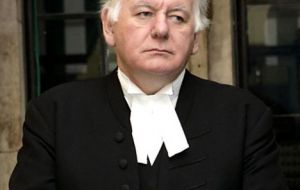MercoPress. South Atlantic News Agency
First time in 300 years: House of Commons speaker forced to stand down
 Michael Martin was elected speaker of the house in 2000
Michael Martin was elected speaker of the house in 2000 The first House of Commons Speaker to be effectively forced out of office in 300 years took place Tuesday when Michael Martin told MPs he intends to stand down. In a brief statement to a packed House of Commons he said he would step down on 21 June, with his successor set to be elected by MPs the next day.
Mr Martin, who will also step down as an MP, has faced criticism over his handling of the MP expenses issue. The Glasgow North East MP has been an MP for 30 years and Speaker for nine.
It was Mr Martin's third statement on the row in eight days - the first, in which he attacked MPs who questioned his handling of the furore, was criticised by many MPs - one accused him of protecting “vested interests”.
On Monday he apologised for his role in events but gave no indication about when he would stand down - only to be challenged by a succession of MPs who asked for a debate on a motion of no confidence in him.
In a statement to MPs on Tuesday which lasted just 35 seconds, Mr Martin said: “I have always felt that the House is at its best when it is united.
”In order to that unity can be maintained, I have decided that I will relinquish office of Speaker on Sunday 21 June.
“This will allow the House to proceed to elect a new Speaker on Monday 22 June.”
He finished by adding “that is all I have to say on this matter” before going on to ask for questions to Foreign Secretary David Miliband.
Mr Miliband said the House would respect his wishes and pay its tributes at “a later date”. But independent MP Bob Spink, who asked the first question, paid “the warmest possible tribute” to Mr Martin - to “hear hears” from MPs.
Mr Martin's spokeswoman said he would stand down as MP for Glasgow North East on June 21, sparking a by-election in what has been considered a safe Labour seat.
Later in a written statement Commons leader Harriet Harman paid tribute to Mr Martin's “passionate commitment to the House” and said he had served “with distinction”.
She said: “Michael Martin's resignation today as Speaker is an act of great generosity to the House of Commons that Members of Parliament from all parties will respect.”
Labour MP Paul Flynn, who was among those who signed the no confidence motion, told the BBC it had been “painful” to see the Speaker forced out but it was inevitable.
But he added: “He had not recognised the seriousness of the situation and... made a disastrous situation even worse by his lack of penitence, by his aggressive attitude by his attempt to blame the whistleblowers.”
Mr Martin's critics say he was the driving force behind repeated attempts by Commons authorities to block details of MPs' expenses from coming out under Freedom of Information legislation.
But his supporters say he has long been the victim of snobbery and has been made a scapegoat for a scandal that has affected all the main parties.
Meanwhile, in other events linked to the row over MPs' second homes expenses, the Metropolitan Police have said they will not investigate how details of claims came to be leaked to the Daily Telegraph.
A spokesman said it was likely the “public interest defence would be likely to prove a significant hurdle” to a criminal prosecution. But he said officers from the Economic and Specialist Crime Command had met senior Crown Prosecution Service solicitors to discuss allegations some MPs had misused public money.
Prime Minister Gordon Brown has said no Labour MP who broke expenses rules would stand at the next election.
And former Conservative minister Douglas Hogg said he would stand down as an MP at the next general election. He has already agreed to repay £2,200 - the cost of clearing a moat at his country estate - which had been on paperwork submitted to the Commons fees office in support of his claims.
Tory backbencher Douglas Carswell - who put forward the motion of no confidence in Mr Martin - said the Parliamentary system had fallen into disrepute with many MPs being seen as “parasites” over the expenses scandal.
But he told the BBC: “Removing Michael Martin is not the end, it is the beginning - a new Speaker has to be reformist, they need to be progressive.”
Mr Martin, Speaker since 2000, is due to meet party leaders later to discuss interim reform proposals for MPs' expenses.




Top Comments
Disclaimer & comment rulesCommenting for this story is now closed.
If you have a Facebook account, become a fan and comment on our Facebook Page!